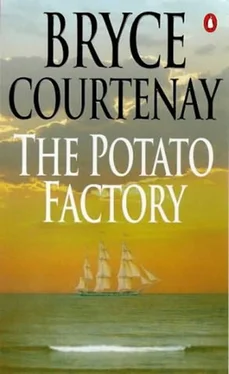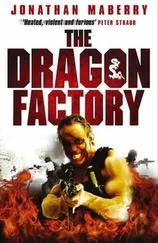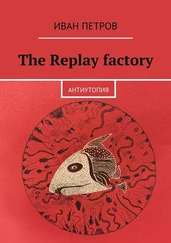'What does 'e want?' she demanded sternly, pushing the candle close to Abraham's face.
'In truth, I swear, he seeks only your high regard, Mistress Mary,' the young tailor protested, much enjoying the sound of such high-minded phrasing. 'Those are the words from his own dear lips,' he added.
'Ha!' Mary replied. 'Ikey never done nothin' in 'is whole life what wasn't for profit! 'Igh regard, you says? Where's the profit to be found in that?'
'His sentiments were most soft in your regard, most spontaneous soft, Miss,' Abraham protested again. ' "Abraham, my dear," he says to me, "you must convince Mistress Mary of my high regard, my most 'umble 'igh regard!" He said it three times, I swear it, Mistress Mary. There was tears in his eyes when he spoke them words and then he handed me the soft. "You must give 'er this fifty pounds, for she 'as been done a great wrong and it is I who is responsible!" That's what he says to me, Gawd's truth!' Abraham concluded.
Mary looked genuinely startled. 'Ikey said that? Ikey said it were 'im what was responsible?'
Abraham nodded. 'He was most sad, most very sad indeed at the inconvenience he'd caused your fair self.'
'Gawd 'elp us! Miracles will never cease!'
Despite her deep suspicion, Mary could think of no way that Ikey, at the moment of his escape, could possibly profit from her by a further penny. So why, she asked herself, had he parted with a small fortune? Could it possibly be for the reasons Abraham had given? Had Ikey grown a conscience? She could not imagine a repentant Ikey, nor one who was capable of feeling the slightest remorse for a fellow human. We all want to feel the love of another and Mary had not been loved since she had been a small child, when she had briefly known the tenderness of a consumptive mother. Did Ikey really love her, not simply regard her as a profitable partner, as she had always quite contentedly supposed? It seemed too bizarre for words that he might do so, or for that matter, that she could harbour in her breast, unbeknownst to her, a love for him in return.
Love was not a word in the vocabulary which had existed between Mary and Ikey. Even on those rare occasions when she had taken him to her bed, there had been no thought of love. Mary had long since packed that hope away, concealing it in the darkest corner of her soul. Love was not for such as her. And so she simply shook her head, silently forcing back a tear, truly not knowing what to think of the whole matter of Ikey's amorous protestations brought on the importuning lips of a young man with a strong sense of melodrama.
At that moment Abraham Reuban produced Ikey's Duke of Wellington medal.
'Ikey wishes you to have this as a further token of his most remarkable esteem, Mistress Mary,' he said, holding the medallion and chain against the light of the candle. 'It be pure gold an' all!'
'So, where'd 'e steal it, then?' Mary asked tartly, though her heart thumped within her breast at the sight of the medallion.
'No, no, missus, it be his luck, what be called his talisman!' Abraham then told Mary the story of the medallion as Ikey had related it to him in the coach.
Mary had a dim recollection of having once observed a gold chain about Ikey's neck. Stripped down to his vest and long johns, the gold chain had disappeared into the top of his tightly clinging woollen upper garment so that she had no knowledge of what might be contained at its extremity. Now the thought that it might be his medallion, Ikey's talisman, opened her heart like a summer rose. She took the Wellington medallion from Abraham and, turning it over, read the inscription nestled between the garland of laurel leaves. Whereupon Mary's broken hands pressed Ikey's talisman to her bosom and she knew with a fierce certainty that she would survive, that she would never surrender and that somehow she had inherited Ikey's uncanny luck.
At that moment, despite his innumerable faults and thinking him no more than she knew him to be, Mary loved Ikey Solomon.
Mary was to spend five months in Newgate Gaol, two months longer than her original sentence, this to await a convict ship bound for Van Diemen's Land. On the 15th of May 1827, with eighteen other female convicts, she was placed in light irons and transported by open cart to Woolwich, where the convict ship Destiny II was berthed to await its full complement of female convicts.
The weather was grand, the winter frost well past, the elm and larch and sycamore, the bright green oak, in new leaf all. The orchards showed a bedazzlement of white and pink, the fancy dress of pear, apple, cherry and of summer's blood-red plum to come. The woods through which the cart rumbled were carpeted with bluebells and the yellow splash of daffodil, in an England ablaze with bud and blossom and the joyous fecundity of spring.
Several of the convicts were heard to sigh that this was a poor time to leave the shores of England, their most ardent wish being to make their last farewell in the fiercest needle sleet and howl of north wind. This, so their memories might be consumed by the bitter gales and so send them, half cheerful, on their way to the hell of Van Diemen's shores.
This sky of clear blue with the high call of larks and the singing of thrush in the hedgerows was too much a bittersweet parting. This single memory of the darling buds of May would linger with them for the remainder of their lives. They would hold their grandchildren in their laps under a different sky, and tell of the soft shining of the English countryside. They would remember these two days, when they had rocked and bumped in shackles along a rutted road, as if, for this short space in time, they had been transported through the gates of paradise itself.
It was an unbearable wrench for several of the younger women, who wept piteously for the time it took to arrive at Woolwich, where Destiny II creaked and groaned to the slap of the tide. They came upon it suddenly at the turn of a large warehouse and they immediately forsook the rattle and rumble of the cobblestones and turned into the quay, where the wheels of the cart squeaked and lurched along the uneven dockside timbers. Only then, with the cart drawn to a halt beside the squat vessel and with the sudden silence, into which dropped the call of a gull and a soft phlurrr from the nostrils of one of the cart horses, did the finality of the sentence of transportation come to each of them.
Standing on the dockside next to the gangway was a diminutive male in frock coat, dirty shirt with a sweat-soiled neckerchief, breeches, hose and tiny brass-buckled shoes much in need of repair. His hair was cropped, though not evenly or in the convict style, and stuck up in raggedy bits an inch or so all about his skull, with whiskers, once dark and now densely speckled with grey. These also stuck out and framed his face from sideburns to the circumference of his chin. Heavy tufted eyebrows, black as pitch, seemed to entirely encase his small bright eyes. Jutting at right angles to this furry visage were two large thin-skinned ears to which the light from the sun behind him gave a bright crimson glow. The total effect was of a remarkable likeness to a simian creature, a monkey dressed in a frock coat, breeches and hose.
'Gawd, look at that!' Mary exclaimed.
The tiny man chuckled and threw an arm upwards pointing to the sky. ' "Gawd", now that be a partickler name what Mr Smiles don't like folks to take in vain! That be three punishments all at once!' He tapped the first finger of his left hand with the forefinger of the right. 'Short rations and no port wine for the father!' He tapped the finger beside it. 'Two days' bread and water in the coal hole, for the son!' He tapped the third. 'Attendance to Bible study for a month, that be for the Holy Ghost!' He looked up at Mary. 'Swear away, me dear, help yourselfs, last chance afore comin' on board to be rid of all that bile! What's your name then?'
Читать дальше












